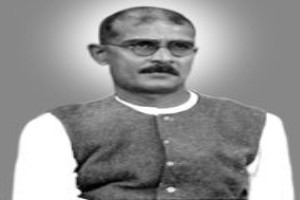
Old features of a backward rural economy seemed destined persistently to remain
 By Mahadev H. Desai*
By Mahadev H. Desai*
Sir Daniel Hamilton came to India some fifty years ago and spent the best part of his life in Calcutta as partner in the firm of Mackinnon, Mackenzie & Co. He had just been to his village school at Scotland for a few years, when his uncle, Sir William Mackinnon, picked him up and, after some years of experience in Scotland, brought him over to India to work under him. All the education that Sir Daniel has had has thus been gained in the school of experience and honest toil, and though his papers bristle with apt quotations from Ruskin and Adam Smith and from the Bible, which he has studied with devoted care, there is in all he writes more an impress of a life lived in the fear of God according to principle, than of studied scholarship.
Like every Scotchman, he belongs to ‘the race of feelosophers’, as Cobbet disdainfully put it, but he is a practical philosopher and does not disdain to choose ‘such tasks as peeping into melon frames.’ After a successful business career in Calcutta, he retired and invested his money in an Estate in the Sunderbans, which is the name of the delta of about three hundred miles of the united streams of the Ganges and the Brahmaputra. But the investment was not so much in a spirit of adventure, nor by way of a well-worked out business proposition, as a field in which to work out his ideas of co-operation, of which he is passionately fond.
Also read: History Recalled: How India’s industry was ruined – 5
One of the Scotchmen he admires most is Livingstone, and though he is no explorer or missionary, he has successfully explored the Sunderbans to find an outlet for the energy of a few thousand of Bengal’s peasants, and he has worked in his own way at his mission of adding to the world’s stock of honest labourers. ‘Labor omnia vincit’ he is never tired of repeating, and he has often chosen for the text of many of his lay sermons Adam Smith’s text: ‘Labour is the fund which supplies all the necessaries and conveniences of life.’ “Gold will never grow corn,” he said in the course of a fine sermon, “nor silver build houses or harbours or piers, nor bank notes catch herring, nor pennies lay eggs. Labour is the Capital which supplies all the things; therefore, there is no real capital but labour.”
He has not worked out all the implications of this great truth, but he has appealed in vain to Government over and over again during the last thirty years to tap the inexhaustible resources of India’s live capital, to understand the importance of what he calls ‘the people’s finance’ and to end unemployment and discontent and anarchy at a stroke. He is no politician and disdains politics, but he deplores as much as any other Indian politician that, in the language of a high official authority, after 150 years of British rule, “the condition of the great mass of the people was still one of stagnation, that the economic condition of the peasants had not been progressing, that indebtedness, instead of decreasing, has tended to increase, that agriculture methods had not improved and that old unsatisfactory features of a backward rural economy seemed destined persistently to remain.”
The talk of the Silver Jubilee of His Majesty’s reign does not enthuse him. It reminds him of the text from the Book of Leviticus: “And ye shall hallow the fiftieth year and proclaim liberty throughout all the land, unto all the inhabitants thereof,” and he appeals to Government no more to keep India’s capital locked up in gold or silver reserves, but to release it “to find work for the workless in the year of Jubilee.”
“During the most dangerous period of the War, the metallic reserve behind the note issues was 33.45 per cent,” he explains. “If a reserve of one-third was sufficient in time of war, why is 78 per cent required in time of peace? In the Government reserves there are tens, if not hundreds, of crores lying idle, which should be set free in this year of Jubilee and harnessed to India’s idle men. For, every idle man is an economic loss to the nation, and a spiritual loss to himself, besides being a danger to the State.”
– to be continued
*Mahadev Desai was an eminent freedom fighter and Mahatma Gandhi’s personal secretary; article courtesy his grandson, Nachiketa Desai.





